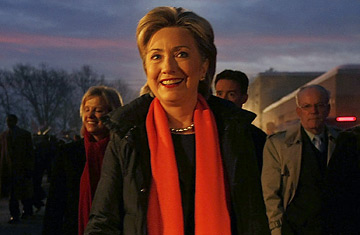
Democratic presidential candidate Sen. Hillary Clinton greets voters on January 8, 2008 in Manchester, New Hampshire.
How did Hillary Clinton confound the pollsters to win New Hampshire? For one answer, you might look to her campaign's state director Nick Clemons, the 34-year-old veteran of former governor Jeanne Shaheen's political operation, who put together and ran a disciplined ground operation that planned for almost every eventuality. "The heart of our ground game was face-to-face contact," he said in an interview Wednesday morning. "I know that sounds like old ward-style politics, but it really works."
Clemons' hire was an important one for the Clinton campaign. Part of a prominent Democratic family from Nashua, he started building his political credentials at the ground level in his home town for the Clinton-Gore reelection campaign. He was also a field director in Al Gore's 2000 presidential bid, before signing on with Shaheen, who had herself had come up as a political operative and had put a strong emphasis on getting the fundamentals right.
The day before the election, Clemons had an army of 4,000 volunteers, knocking on 105,000 New Hampshire doors — an impressive number, given that her total vote came to around 110,000. It helped that "we knew who our voters were going in," Clemons says. Early on, Clinton's team had put together a list of 70,000 of her most likely supporters, slicing and dicing the data by every demographic measure of education level, income and gender to figure out whom they needed to pursue. The answer: "It was women. ... We knew we had to go after those women, and make sure they voted." Those deemed least likely to actually make it to the polls got three visits over the final weekend.
But Clemons also made some other bets. For instance, his team figured Iowa "would come out, at best, a muddle," he said. As it happened, it was much worse for Clinton than that. But Clemons had aggressively pushed her supporters to vote absentee, beginning in December — in other words, "to get their votes in before Iowa even happened."
That emphasis on absentee ballots made particular sense in New Hampshire for other reasons. One is that many of the state's residents commute to jobs in Boston, which means they could be prevented by traffic — or after-work fatigue — from making it to the polls. And schools such as the University of New Hampshire, Keene State College and Plymouth State University — which have mostly in-state students who register to vote on campus — would still be on winter break come primary day. Clinton's campaign urged them to vote absentee before going home.
The Iowa caucuses, with their huge boost for Obama, had an effect, Clemons acknowledges. "We were losing people at the end," he says. "But we were also picking up a lot of people." Those who were coming back to be with Clinton at the end were mostly women. But then, Nick Clemons had that figured out all along.
